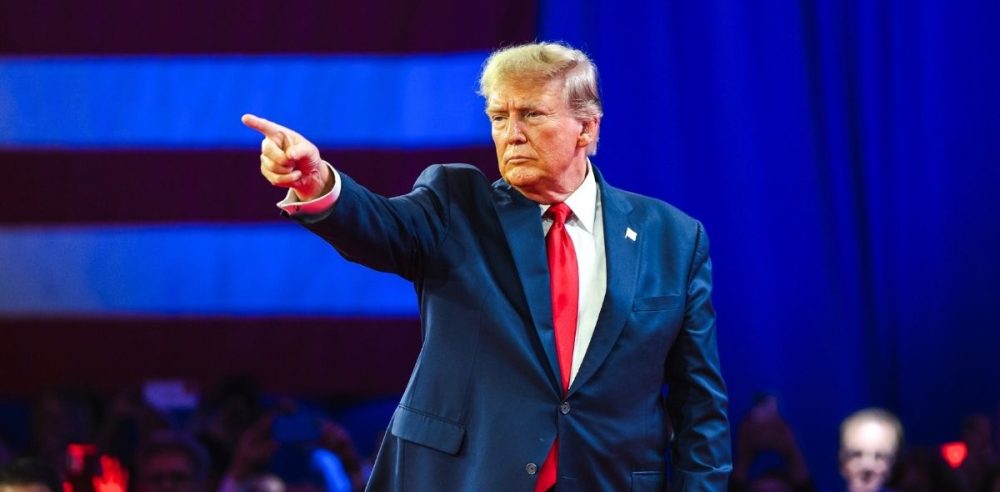President-elect Donald Trump has laid out an extensive list of executive actions he plans to undertake on his first day in office, with a primary focus on immigration, energy, and military reforms.
Among his top priorities, Trump has vowed to end birthright citizenship for children of undocumented immigrants and initiate a major deportation push, aiming to reshape the immigration system. His pledge to start deportations would be one of the largest efforts of its kind in U.S. history, underscoring his commitment to enforcing a stricter immigration policy.
“President Trump should clean house on Day One because that’s exactly why the American people delivered him this mandate,” said Mike Davis, a pro-Trump lawyer and founder of The Article III Project, a group that advocates for conservative judicial appointments, told The Washington Times. “He will cull illegal immigration, remove career bureaucrats who undermine his agenda, de-politicize law enforcement, make Big Tech pay for their censorship of conservatives, and pardon the Jan. 6 defendants unjustly charged by the Biden Justice Department.”
Another key part of Trump’s agenda is ramping up U.S. energy production.
He has promised to support oil, gas, and liquefied natural gas projects, reversing many of President Biden’s energy policies, including eliminating incentives for electric vehicle production. Trump’s “drill, baby, drill” approach aims to reduce energy costs domestically and make the U.S. a leader in energy exports. He also intends to scrap the “tailpipe” emissions mandate, focusing instead on fossil fuel infrastructure development, with plans to lift Biden’s restrictions on gas export terminals.
On foreign policy, Trump has made the ambitious claim that he will work to end the Russia-Ukraine war before he even takes office.
Details are sparse, but the pledge highlights his intention to leverage U.S. influence in international conflicts. His approach also includes establishing a “warrior board” of retired military personnel who would have the authority to assess high-ranking military officials and recommend removals, a proposal aimed at enhancing military accountability following the controversial 2022 Afghanistan withdrawal.
Trump’s team, bolstered by MAGA think tanks and former administration officials, has spent four years preparing a detailed plan for “Day One” changes, making the upcoming term more strategically focused than his first. This organized approach includes cabinet appointments of Trump loyalists and conservative figures, such as Susie Wiles as chief of staff and Stephen Miller as deputy chief of staff for policy, signaling his intent to pursue a conservative, hardline agenda.
Tom Homan, former acting ICE director, will be tasked with overseeing Trump’s renewed focus on border control and deportations as the “border czar.” Trump also plans to reinstate the “Remain in Mexico” program, which would require asylum seekers to wait in Mexico while their cases are processed. His administration also seeks to end Biden’s parole programs for migrants from certain countries, marking a return to stricter immigration policies.
Trump’s promise to end birthright citizenship by blocking automatic citizenship for children born to undocumented immigrants could face legal challenges, as the 14th Amendment currently grants citizenship to “all persons born or naturalized” in the U.S. This move could revive debates over constitutional interpretations, especially surrounding birthright citizenship and birth tourism, which Trump has publicly criticized.
In addition to immigration and energy policies, Trump’s commitment to “clean house” includes targeting career bureaucrats, reforming law enforcement to align more closely with his policies, and challenging Big Tech companies he perceives as censoring conservative viewpoints. His goals reflect his broader ambition to de-politicize federal agencies and enforce stricter adherence to his agenda.
Trump’s policy advisor, Robert F. Kennedy Jr., hinted that the scale of changes Trump envisions could be unprecedented, likening it to a “revolution” in the U.S. government structure. Kennedy has suggested that Trump’s plans may lead to sweeping reforms across federal agencies, departing from conventional policy approaches and signaling that Trump’s next term could fundamentally alter government operations and policies.


